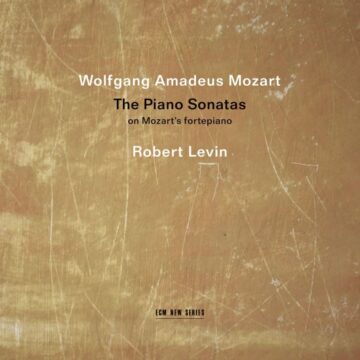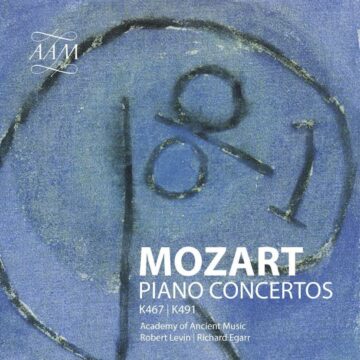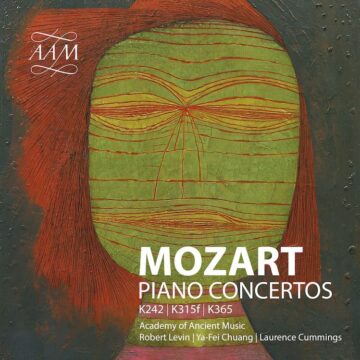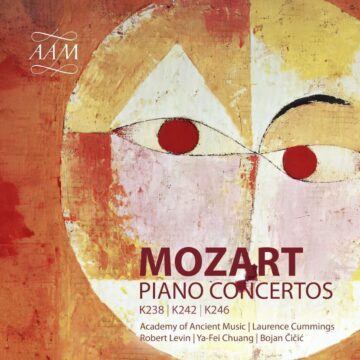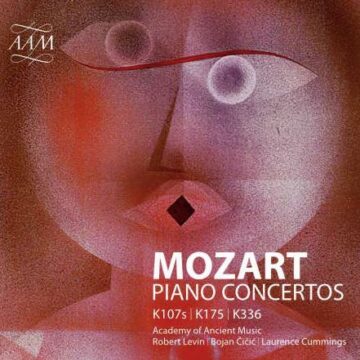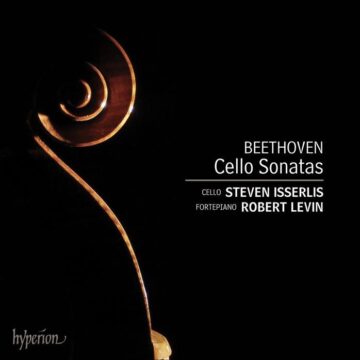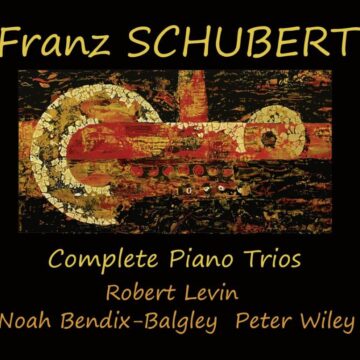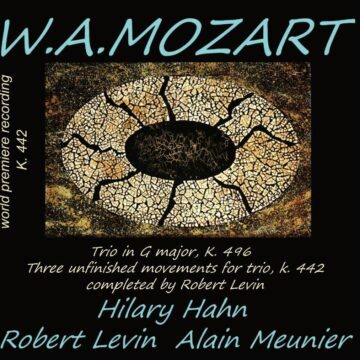Robert Levin has performed throughout the world, appearing with the orchestras of Atlanta, the BBC, Berlin, Birmingham, Boston, Chicago, Cleveland, Detroit, La Scala, Los Angeles, Montreal, Philadelphia, Toronto and Vienna on the Steinway, and with the Academy of Ancient Music, La Chambre Philharmonique, the English Baroque Soloists, the Orchestra of the Age of Enlightenment and the Orchestre Révolutionnaire et Romantique on early keyboards. Renowned for his improvised cadenzas in Classical period repertoire, Robert Levin has made recordings of a wide range of repertoire for AAM, Archiv, Bridge, CRI, Decca/Oiseau-Lyre, Deutsche Grammophon, Deutsche Harmonia Mundi, ECM, Hänssler Classic, Hyperion, Klavierfestival Ruhr, New York Philomusica, Philips and SONY Classical, including Bach’s complete harpsichord concertos with Helmuth Rilling, the six English Suites and both books of the Well-Tempered Clavier (Hänssler Edition Bachakademie); a Mozart concerto cycle with Christopher Hogwood, Richard Egarr, Bojan Čičić, Laurence Cummings, and the Academy of Ancient Music (Decca/Oiseau Lyre and AAM); the Beethoven concertos with Sir John Eliot Gardiner and the Orchestre Révolutionnaire et Romantique (Archiv); the complete piano music of Dutilleux (ECM; Bernard Rands’ Preludes and Impromptu (Bridge); and the complete Beethoven sonatas and variations for fortepiano and ’cello with Steven Isserlis (Hyperion). Recent releases include the six Bach Partitas (Grand Prix International du Disque)(Le Palais des Dégustateurs), the complete Schubert piano trios with Noah Bendix-Balgley and Peter Wiley (Le Palais des Dégustateurs), and the complete Mozart sonatas on Mozart’s Walter piano (ECM) (Diapason d’Or de l’Année).
A passionate advocate of new music, Robert Levin has commissioned and premiered numerous works, among them Denissov’s Paysage au clair de lune, Joshua Feinberg’s Veils (2001), the Second Piano Sonata of John Harbison (2003), the Piano Concerto Chiavi in mano of Yehudi Wyner (2005, Pulitzer-Prize 2006), the Préludes of Bernard Rands (2007), the Piano Concerto by Thomas Oboe Lee (2007) and Träume by Hans Peter Türk (2014).
He has a long partnership with violist Kim Kashkashian and appears frequently with his wife, pianist Ya-Fei Chuang, in duo recitals and with orchestra, and with cellist Steven Isserlis. A noted Mozart scholar, Mr. Levin’s completions of Mozart’s Requiem, C-minor Mass, and other unfinished works have been recorded and performed throughout the world. From 2002 to 2024 he was President of the International Johann Sebastian Bach Competition (Leipzig, Germany). He was awarded the Bach Medal of the City of Leipzig in 2018 and the Golden Mozart Medal by the Internationale Stiftung Mozarteum in Salzburg in 2024. From 1993 to 2013 he was Dwight P. Robinson, Jr. Professor of the Humanities at Harvard University and is presently Visiting Professor at The Juilliard School and the Sibelius Academy, and International Chair at the Guildhall School of Music and Drama in London. From 2007 to 2016 he was Artistic Director of the Sarasota Music Festival. He is a member of the American Academy of Arts and Sciences and honorary member of the American Academy of Arts and Letters.
This biography is for information only and should not be reproduced.
Mozart: Piano Concertos Nos. 25 & 27, and Ch'io mi scordi di te? K505
AAM (AAM0045, June 2024)
Academy of Ancient Music completes its uplifting cycle of Mozart’s piano concertos
Performances are full of life and Robert Levin remains quick-witted as soloist. The Academy of Ancient Music’s cycle of recordings of the complete Mozart piano concertos has changed its look several times. As designers have come and gone across the 13 volumes, album covers have been rethought in several different styles, a visible pointer to the 30 years it has taken to get the project completed.
Above all, the performances feel as spontaneous as they did on the first volume. The selling point of the cycle is that Robert Levin improvises cadenzas and other ornamentation in the heat of the moment, as Mozart would have done. The sense of freedom is infectious.
Richard Fairman, The Financial Times, 10 July 2024
So is the 15,001st recording of these works worth the bother? Yes indeed. Under Richard Egarr’s direction, the freshness of the music is delightfully brought out, with Levin adding his own graceful cadenzas and delicate contributions to the ornamentation.
Michael Church, BBC Music Magazine, August 2024 issue
It is eminently fitting that Mozart's crowning concerto, No. 27 in B flat, K 595, at last concludes this phenomenal project. Levin and the AAM's performance is vibrantly alive, Levin's shaping of melody and passagework exemplary.
What an achievement this this wonderful set is; and quite right it should be crowned by these two titans of Mozart's œuvre.
Colin Clarke, Classical Explorer, 7 July 2024
This, as with the other twelve discs, is outstanding. The musicianship quality, rhythmic precision, attention to detail, and first-class recording from the AAM's sound engineers are all remarkable.
The K503 and K595 have all of the hallmarks that we have come to expect from the AAM: well-judged dynamics and tempi, Levin's superb spontaneously improvised cadenzas à la Mozart, and flawless ornamentation. After all these years, Levin has achieved what he set out to do in ‘breathing new life into these timeless compositions by reinstating improvisation as a central element, echoing Mozart’s original intent’.
Andrew Palmer, Yorkshire Times, 20 July 2024
Mozart Piano Concertos Nos 6 – 8 (CD)
AAM (AAM044, February 2024)
The main event is Mozart’s music itself – and the performance is constantly alive, alert and superbly done. … If the sound is one delight, others include the deft playing, sprightly tempos, and dynamics that convey drama without ever being exaggerated. The 11th disc features the two-piano version of the Concerto No.7 for three pianos. Here we get the full version, with Levin on tangent piano, Chung on fortepiano and Laurence Cummings on harpsichord. A lively melting-pot, beautifully recorded.
Rebecca Franks, BBC Music Magazine *****
Robert Levin plays with such personality and identification with the music that rather than being lost in the melee, he becomes an equal protagonist peeping out of and then retreating into the orchestral texture. It’s intriguing and you (metaphorically) lean into the performance to hear clearly what’s going on. … The twinkle of the tangent piano is closer to the zing of the harpsichord than the more rounded sound of the fortepiano, rather as if the tangent and the harpsichord were conspiring in their twangy frolics, while the fortepiano comes across almost as an adult interloper from another world entirely. All that’s missing from this intriguing and gently provocative album is a parallel recording of one of the movements with the instruments swapped to demonstrate all the sonic possibilities.
David Threasher, Gramophone
Mozart Piano Concertos No.5 & Church Sonata No.17 (CD)
AAM, June 2023
Levin's reconstruction of No.51 from Nannerl's notebook brings a depth to this very early work. ... Levin's choice of organ ... for the K175 D major concerto assists his enchanting reimagining of Mozart's first newly composed keyboard concerto. AAM are on top form with lean string lines and uplifting wind and brass sonorities.
...Levin's incisive harpsichord ... and the warmth of AAM's strings make for a more enriching listening experience.
Ingrid Pearson, BBC Music Magazine *****
Mozart Concertos no. 21 & 24 (CD)
AAM, March 2023
The fervor, the flame, the desire is palpable... Levin is the world's boldest in celebrating Mozart's instrumental vocality.
Le Devoir *****
... marvellously satisfying performances that are always full of surprises. Levin is the leading exponent in recreating the Mozart style on the spot...these performances have plenty of character... The remaining four discs are eagerly awaited.
Richard Fairman, Financial Times *****
Levin’s playing is what reveals the coyness and delicacy of Mozart’s writing throughout, with pristine articulation and inquisitive phrases... Levin’s cadenza captures the style and character of the work...
Azusa Ueno, The Classic Review
There can be few keyboard players more thoroughly drenched in Mozartian style than Levin, and his incursions - thoughtful, cheeky, inventive, resourceful - are always true to the spirit of the music.
David Threasher, Gramophone Magazine
The piano dances and sparkles under Levin's featherlight touch... Levin springs surprises in many elaborations and decorations... the cadenzas are extremely witty... a light toned eloquence that is very touching.
Nicholas Kenyon, BBC Music Magazine *****
Immediately, the comfortable rapport between Levin and the AAM (and Egarr) is absolutely evident, and Levin’s innate understanding of every note Mozart wrote springs out of the speakers. Incidentally, there are notes Mozart didn’t write, too – Levin’s long argued for improvisation as being as intrinsic part of Mozart’s music, and he’s totally convincing with the brief asides he adds in. …The real highlight here is Levin’s reading of the sublime slow movement. It’s gentle, lyrical, but also understated, like a conversation with a good friend.
Paul Ballam-Cross, Limelight Magazine
‘Wolfgang Amadeus Mozart – The Piano Sonatas on Mozart’s Fortepiano’ ECM Records
released on 16/09/2022
(…) And boy does it show, with Levin’s fluent, improvisational yet scrupulously historically informed approach evident in every bar of these highly engaging, often surprising accounts.
(…) Such as No 8 in A Minor K310: in Levin’s hands so exciting, visceral even. No 12 in F K332, colourful and dramatic and adorned with those improvised embellishments that Levin lavishes with such care and taste throughout, such that they are never superfluous and always expressive of structure as much as feeling.(…) I was moved to ecstasy.
Will Yeoman, The Limelight Magazine *****
You might think the instrument’s modest size and sound would restrict expression, yet the reverse seems true: Levin zooms in fearlessly, placing the music’s emotion and narrative progression centre stage. The crucial factor is the profound understanding, sophistication and sense of joy with which he delves into the personality of the composer, not just that of his piano. (...) Each note is inhabited with vitality, each phrase urgent with meaningful expression. Levin gives his own expertise in improvisation its head during repeats and restatements – already virtuosic music blossoms out with dazzling splashes of fresh fingerpaint, extending to audacious amplifications of detail in melodic lines and harmonies. Would Mozart have had so much fun with them? I reckon so. The whole project is a stunner. Without neglecting faithfulness to the letter, Levin prioritises faithfulness to the spirit. This treasurable set may cast crucial light not only on these sonatas, but also on how we consider the very nature of historical performance.
Jessica Duchen, The BBC Music Magazine *****
Levin imbues this repertoire with vibrant life and deep meaning at every turn, not to mention his astonishing embellishments on repeats. Levin’s completions of three unfinished or fragmentary Mozart sonata movements are so convincingly idiomatic that you’d never be the wiser. In short, Robert Levin’s Mozart sonata cycle is a testament to his painstaking yet practical scholarship, intelligent musicianship, and total command of the keyboard. (...) Even if you already own one or two or more Mozart sonata cycles, make plenty of room for Levin’s insightful artistry. You won’t regret it.
Jed Distler, Classics Today
The brilliant Robert Levin (...) embarks on one of the most musical, spontaneous sets of sonatas that can be imagined. Levin has a superb grasp of not only sources but also the power of gesture. Levin’s timing of Mozart’s gestures is perfect, as is his realization of orchestratiomal equivalencies. Documentation is spotless, an education in itself, while presentation is of the very highest echelon. Levin presents us with an immense achievement, one that without doubt will illuminate, educate and, best of all, nourish the soul, all caught in perfectly judged sound.
Colin Clarke, Fanfare Magazine *****
He’s not shy about exploiting the potential to its fullest, and pushing the instrument to the limits of its expressive and tonal possibilities. Levin’s rich ornamentation has attracted considerable attention. I find it entirely convincing, giving these performances an oratorical, in-the-moment electricity, as the speaker explores his subject with extemporaneous insight, elaboration and emphasis. He has said his goal was to leave no clue as to where his pen took up and Mozart’s left off, and he has succeeded. The results are seamless, and satisfying.
Philip Kennicott, Gramophone
Beethoven Piano Concerto No. 3
Scottish Chamber Orchestra (November 2017)
The result was edge-of-your-seat stuff, sometimes raising a smile, often raising eyebrows, but carried through with utter conviction and brilliant, sometimes rather hard-edged clarity.
David Kettle, The Scotsman ****
Robert Levin, who has just celebrated his 70th birthday, brought his renowned erudition to the solo part, as well as the flair of his own improvised cadenzas, always staying clearly within the embrace of Beethoven’s own themes.
Keith Bruce, The Herald ****
Alte Oper Recital
Mozart Saal, Frankfurt
Erfolgreich Musik machen und erfolgreich über sie reden können wenige. Ein solcher Universalkünstler, bekannt auch als Vollender berühmter Fragmente wie etwa Mozarts Requiem, ist der Pianist Robert Levin.
Gerhard Schroth, Frankfurter Allgemeine Zeitung
Hilary Hahn Recitals
European and US Tour (March 2017)
A Mozart sonata, K. 481, followed. Again it was Levin whose dynamism collared our ears… it was clear that our musicians were enjoying a conversation.
…Levin’s solo turn followed in Hans Peter Türk’s Träume, another welcome UK premiere. Its angular opening line suggested an academic fugue was coming. Yet bell sounds and free-flowing fingers soon whisked us into a reflective world much more suited to the music’s purpose as a memorial for the composer’s late wife.
The final proof of Hahn’s rebirth came in Schubert’s Rondo, D. 895. For thrust and snap she and Levin were now equal, prancing together, jubilant in attack. The applause rang out; the encores arrived, topped off by Lili Boulanger’s Cortège and Nocturne, easing us beautifully into the night. This was a very enjoyable second half.
Geoff Brown, The Times ****
Levin was a full partner, with Hahn a lyrical presence (the slow movement [of the Kreutzer Sonata] seemed downright magical).
Olin Chism, Fort Worth Star Telegram
Their joint recital Saturday night at Jordan Hall as part of the Celebrity Series brought the best of both worlds… Levin brought dexterous technique and fine touch to both works. In the third movement of the Bach sonata, which featured Levin by himself, his phrases swirled elegantly in a singing, almost fruity tone…
Many of the Mozart’s violin sonatas are juvenilia, but K. 481 is a mature work rich in flowering melody. In Saturday’s performance, the first movement had moments of drama, with Hahn and Levin traversing both the delicate and dark themes with finesse. Levin was the focus of the second movement as he conjured soft phrases with clean, pure tone.
Long and rapturous applause brought Hahn and Levin back to the stage for three encores. These short works revealed yet again that Hahn and Levin are a duo of rare and sensitive musicality.
Aaron Keebaugh, Boston Classical Review
Mozart’s Sonata in E-Flat Major was outstanding. A Mozart scholar and expert improviser in the Classical style, Levin played with a tender sort of assertiveness. Clear, connected phrases flowed like a transparent sheet of water blooming from a fountain… Three encores followed… After each, Hahn and Levin bowed to each other, and then to the audience, standing together as equals.
Zoë Madonna, The Boston Globe
Hilary Hahn Recitals
US Tour (October 2016)
The Bach and the Mozart are true duets, in which the piano and violin have equal roles, and Levin made an arresting partner. Both players sounded so spontaneous that it seemed miraculous they were so perfectly coordinated. The Bach was as fluid and swift as rushing water, and the Mozart sounded as contemporary as the Abril.
Anne Midgette, The Washington Post
Levin was a consummate accompanist, never overwhelming Hahn’s solo lines or forcing her to make herself heard. She sounded, as a result, completely at ease throughout the evening.
Charles T. Downey, Washington Classical Review
Beethoven Piano Concerto No. 3
Philharmonia Baroque Orchestra (October 2016)
Levin’s solo work in the concerto was marked not only by nimble technique and expressive clarity, but by the deep knowledge of the period that gives his every performance such a sense of linguistic mastery. At the most obvious level, that enables him to improvise his own cadenzas — the showy, unaccompanied flourishes that come right before the conclusion of nearly every movement — just as Beethoven and his contemporaries would have done, and to do so firmly within the bounds of Beethoven’s musical grammar and vocabulary.
Joshua Kosman, San Francisco Gate
Robert Levin’s Concert Repertoire
| J. S BACH | Brandenburg Concerto No. 5 |
|---|---|
| BEETHOVEN | Complete piano concertos Rondo WoO 6 |
| BRAHMS | Piano Concerto No. 1, Op. 15 |
| FRANCK | Variations symphoniques |
| HARBISON | Piano Concerto |
| MENDELSSOHN | Piano Concertos in A minor No.1, Op. 25 |
| MOZART | Complete piano concertos and rondos |
| POULENC | Concerto for 2 Pianos |
| SCHUMANN | Complete works for piano and orchestra |
| STRAVINSKY | Concerto for Piano and Winds |
| WYNER | Piano Concerto (Chiavi in mano), dedicated to RL |
These photos are available to be downloaded.
Right click on a desired image and select the "Save Link As" option.

